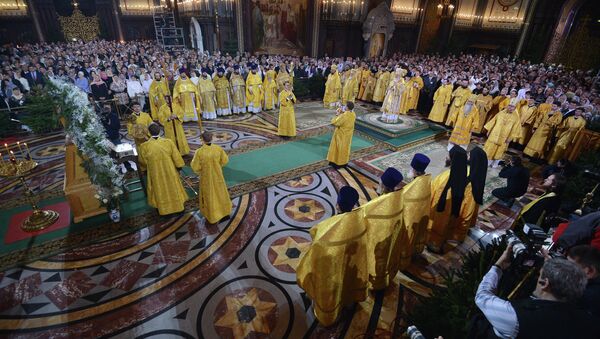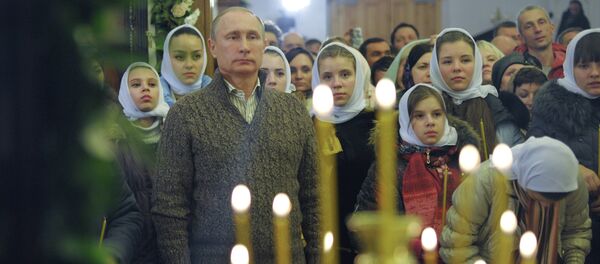Christmas (the birth of Christ) is one of the main feasts of the Orthodox Christian calendar. According to the Gospel of Luke, Jesus Christ was born to Virgin Mary in the city of Bethlehem during the reign of Emperor Augustus. Augustus ordered a census to be carried out across the entire Roman Empire, including Palestine, which was a part of the empire at the time.
Jews had their own tradition of popular census by tribe and lineage, and each tribe and lineage had their own cities and ancestral sites.
The Virgin Mary and Joseph were from the line of King David and had to travel to Bethlehem, the city of David, to register as subjects of Caesar. There, all the inns were full due to the census and Mary and Joseph could only find shelter inside a limestone cave being used as a stable. When they settled for the night, Mary gave birth. The Baby Jesus was born surrounded by hay and straw on a cold winter night. The Virgin Mary wrapped the Divine Infant in clothes and put him in a manger, a feeding trough for cattle.
In the midnight silence, shepherds, who were guarding their sleep, received news that a Savior had been born.
An Angel appeared before them and said: "Do not be afraid. I bring you good news that will cause great joy for all the people. Today in the town of David a Savior has been born to you; he is the Messiah, the Lord. This will be a sign to you: You will find a baby wrapped in swaddling clothes and lying in a manger."
Suddenly, the heavenly host appeared with the Angel, praising God. When the Angels left them, the shepherds said to one another: "Let's go to Bethlehem and see what has happened there."
They left their flocks and found the cave with Mary and Joseph, and the Baby Jesus, lying in a manger. The shepherds told the Holy Family what they had been told about the infant Jesus.
At the time, according to the Gospel of Matthew, the Magi (the wise men from the East) were on their way to bring gifts to the Christ Child. They had been waiting for a great king to come into the world. Seeing an unusual star rise above Bethlehem at the moment when Christ was born, the Magi, whose names, according to legend, were Caspar, Balthasar and Melchior, went to Jerusalem to ask where to find the Savior.
Having also learned about the Divine Birth, King Herod, who ruled Judea at the time, became frightened and called for the holy family. He found out from them the time when the Star of Bethlehem appeared in the sky and with that, the possible age of the future king, whom he feared could be a rival. Herod asked the Magi to reveal to him the place of the infant's birth, "so that I too may go and worship him."
Led by a guiding star, the Magi reached Bethlehem where they bowed to the newly-born Savior and presented him with gifts of gold, frankincense and myrrh. The gifts had a symbolic meaning: the gold was given to Christ as a tribute to a king, frankincense was a gift to God and myrrh was a gift to a mortal man because the incense was used to anoint the dead. The Magi then received God's revelation not to return to Jerusalem and went back to their country by a different road.
After finding out that the Magi had refused to obey him, the enraged Herod sent soldiers to Bethlehem with an order to kill all male infants younger than two years of age. According to the Gospel, Joseph had a dream warning him of the impending danger and fled with Mary and the Infant Christ to Egypt, where the Holy Family remained until Herod's death.
The Church established Christmas as a feast in remembrance of the Nativity of Christ. Its celebration dates back to the time of the apostles. The Apostolic Constitutions say: "Brethren, observe the festival days; and first of all the birthday which you are to celebrate on the twenty-fifth of the ninth month" (starting from March).
In the first three centuries A.D., when Christians were being persecuted, several churches celebrated Christmas jointly with the Baptism as the feast of Epiphany on January 19 (January 6, on the Julian calendar). The reason was probably the belief that Christ was baptized on the day he was born.
Until the 7th decade of the 1st century, the overwhelming majority of Christians were Jewish by birth, and there was little discussion among them about the exact date of the Savior's birth, as it was not in the Jewish tradition to know one's birth date. The first attempts to determine the day of the Nativity were made in the 2nd and 3rd centuries, when it began to be observed as a major Christian feast.
In 337, Pope Julius I approved December 25 as the date of Christmas. Since then, Christendom celebrates Christmas on December 25 (with the exception of the Armenian Church, which celebrates Christmas and Epiphany as a single feast of the Epiphany). The Russian Orthodox Church also celebrates Christmas on December 25, but as it did not accept the calendar reform by Pope Gregory XIII, the feast is observed on that date in accordance with the old Julian calendar, or on January 7 according to the new Gregorian calendar.
Christmas is preceded by the Nativity Fast, when the soul is purified in prayer and repentance, and the body by abstaining from food. The Fast begins on November 28 (November 15 in the Julian calendar) and lasts until January 7 (December 25, Julian calendar). The last day of the Fast is Christmas Eve, when fasting is particularly strict and believers attend Vespers, or the evening service. On Christmas Eve, churches are adorned with spruce branches, flower garlands and lights for the occasion.
After the festive Vespers have been served, the Vigil begins with a joyful proclamation from Isaiah: "God is with us!" followed by a celebratory morning service. It is now that the full Canon "Christ is born…," one of the most beautiful in the Orthodox tradition, is sung for the first time: "Christ is born! Glory to Him! Christ has descended from the heavens, welcome Him! Christ is now on earth, O be jubilant! Sing to the Lord, the whole earth!"
Concluding the celebration of the Nativity of Christ is the Divine Liturgy when Communion is received.
On the second day of the feast, the Synaxis of the Theotokos is celebrated. It combines the hymns of the Nativity with those celebrating the Mother of God. This feast, the assembly in honor of the Theotokos, is probably the most ancient celebration of Mary in the Christian tradition, the very beginning of her veneration by the Church.
This period between Christmas and Epiphany is called Christmastide. It is, in fact, is the continuation of the Nativity.
At Christmas, it is customary in many families to decorate a Christmas tree and give each other gifts. Christmas tree branches are adorned with various sweets and glowing lights.
After the church service on Christmas day, people would break the fast with all kinds of meat and fish dishes, as well as a jellied or roasted goose with apples. Roasted poultry adorned the Christmas table. Chicken was served cold, while goose or duck was served hot. Cold chicken was garnished with pickles, tomatoes and herbs, while hot poultry was served with roast potatoes. In every home, there were pies, cakes and (small cakes made of unleavened rye dough with various fillings). The Christmastide cakes were also given out to carol singers.
From 1917 onward, the atheist Soviet Union banned not only the celebration but even the mentioning of Christmas. Christmas services were conducted in secret.
On December 27, 1990, in response to an appeal by Patriarch Alexy II and out of respect for the religious feelings of believers, the Supreme Soviet of the RSFSR declared Christmas a holiday. The resolution came into effect on January 14, 1991.
On the previous Orthodox Christmas Eve, observed on January 6, 2014, monks from the St. Paul's Monastery on Mount Athos brought Gifts of the Magi to Russia. It was the first time the relic was put on display outside of Greece. In Moscow believers came to worship it at the Cathedral of Christ the Savior. The relic was then taken to St. Petersburg and Minsk, followed by the Kiev-Pechersk Lavra.
According to the organizing committee the Gifts of the Magi were worshipped by nearly 600,000 people during their 10-day residence in Russia. In Belarus, 480,000 paid their respects over the course of a week.



